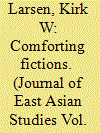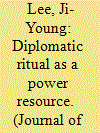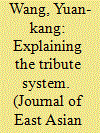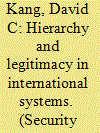|
|
|
Sort Order |
|
|
|
Items / Page
|
|
|
|
|
|
|
| Srl | Item |
| 1 |
ID:
121728


|
|
|
|
|
| Publication |
2013.
|
| Summary/Abstract |
Observers and practitioners of Sino-Korean relations in both the pre- and post-nineteenth century have utilized powerful "comforting fictions" to describe and justify power asymmetry. In the prenineteenth- century period, the idea of the "tribute system" put a veneer of Confucian benevolence on what a closer examination reveals to have been unequal and coercive relations. Western proponents of the Westphalian system of sovereign equality saw the new norms of international relations as potentially liberating to Korea, a way to free Korea from the Chinese yoke. However, Westphalian equality, too, was a comforting fiction that masked the reality of imperialism-both formal and informal. The Qing empire played a heretofore neglected role in both types of unequal coercive relations between Korea and the outside world.
|
|
|
|
|
|
|
|
|
|
|
|
|
|
|
|
| 2 |
ID:
121731


|
|
|
|
|
| Publication |
2013.
|
| Summary/Abstract |
What explains Korea's success in surviving as an independent state for over 2,000 years, not annexed to China, when it shares a border with this powerful imperial neighbor? I argue that diplomatic ritual can be conducive to managing asymmetric power relations and that the Korean state and the Chinese state prior to the nineteenth century used the diplomatic ritual of investiture in a strategic manner as a signaling mechanism to manage the expectations of each side. Drawing insights from ritual studies, I offer three specific mechanisms: (1) regularity and precision, (2) strategic ambiguity, and (3) the manipulation of symbols, through which the ritualization of power relations reduces the tension arising from the disparity in power. The empirical evidence comes from an investigation of a total of sixteen investiture cases between Choso n Korea and Ming China between 1392 and 1644. It shows that the granting and seeking of investiture on both sides was not only a way of signaling their commitment to the status quo, but also a medium of negative soft power through which the stronger side could change the status quo relations to its favor using the symbolic power embedded in the investiture ritual.
|
|
|
|
|
|
|
|
|
|
|
|
|
|
|
|
| 3 |
ID:
121729


|
|
|
|
|
| Publication |
2013.
|
| Summary/Abstract |
Premodern Sino-Vietnamese relations may be described by three systems of engagement that I have labeled Strong China/Weak Vietnam, Weak China/Strong Vietnam, and Strong China/Strong Vietnam. These three states of interaction appear at various points, beginning with Vietnamese encounters with the Qin empire (221- 206 b.c.e.) through the early modern era. Brantly Womack has already described the historical Sino-Vietnamese relationship as politically "asymmetrical" with China playing the strongman role, and the three relational equilibriums described here do not contradict Womack's thesis. Instead, I explore how the generally asymmetrical states of affairs were molded by historical context and the specific ambitions of elite in the frontier region. While the general conditions of the Sino-Vietnamese relationship were asymmetrical, the choices available to Chinese and Vietnamese leaders in different periods varied widely.
|
|
|
|
|
|
|
|
|
|
|
|
|
|
|
|
| 4 |
ID:
121727


|
|
|
|
|
| Publication |
2013.
|
| Summary/Abstract |
In this article I remedy the popular misconception that the East Asian international system was hierarchical and non-egalitarian in history. I argue that the tribute system is mainly a function of power. Backed by power, Confucian norms and rules became the rules of the game in the system. Power asymmetry gave rise to hierarchy in foreign relations while power symmetry led to diplomatic equality between great powers. East Asia during the tenth to the thirteenth centuries was a multistate system without a regional hegemon. In the Song-Liao international system (960-1125), due to power symmetry, the two great powers conducted their foreign policy on the basis of formal equality. In the Song-Jin international system (1127-1234), the weaker Song China became a Jin vassal state and acknowledged its inferior status in the Jin-derived hierarchy. In studying historical East Asia, Confucian rhetoric needs to be examined against power reality. Only by taking power seriously can we get a better understanding of the East Asian international system.
|
|
|
|
|
|
|
|
|
|
|
|
|
|
|
|
| 5 |
ID:
101278


|
|
|
|
|
| Publication |
2010.
|
| Summary/Abstract |
The East Asian "tribute system" from 1368 to 1841 comprised an enduring, stable, and hierarchic system, with China clearly the hegemon, in which cultural achievement was as important as economic or military prowess. Most significant is the recognition that the Chinese tributary order was in fact a viable and recognized international system with military, cultural, and economic dimensions that all intersected to create a very interesting and stable security system. Recently it has become fashionable in historical circles to question the viability of the tributary system in part because scholars have become increasingly aware of the realties behind Chinese rhetoric. However, more nuanced studies and new interpretations only serve to underscore the centrality of the system for its participants. This paper demonstrates that there is a hierarchical relationship-generated by a common culture defined by a Confucian worldview-in place in the context of China and the East Asian states and helps clarify the distinction between an international system based on polarity and an international society based on culture.
|
|
|
|
|
|
|
|
|
|
|
|
|
|
|
|
| 6 |
ID:
121732


|
|
|
|
|
| Publication |
2013.
|
| Summary/Abstract |
In the fifteenth and sixteenth centuries the Choson Korea government designed and utilized hierarchical tribute systems for managing interactions, in particular, trade, with Japanese and Jurchen elites. Korean officials separated maritime and overland contacts, divided the contacts further into carefully delineated reception grades and diplomatic statuses, and designed detailed procedures for interaction. More specifically, diplomatic status determined the regulations by which the court provided reception and then trade to a contact.
|
|
|
|
|
|
|
|
|
|
|
|
|
|
|
|
|
|
|
|
|